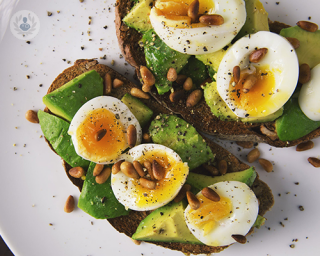Nutrition in pregnancy
Dr Balvinder Sagoo - Obstetrics & gynaecology
Created on: 01-17-2014
Updated on: 09-26-2023
Edited by: Kate Forristal
What is the recommended diet during pregnancy?
During pregnancy, you should eat a healthy diet to get the right balance of nutrients and vitamins that you and your baby need. These include:
- fruit and vegetables
- well cooked meat
- well cooked fish
- hard or aged cheese and yoghurt
On the other hand, you should generally avoid:
- complex carbohydrates, such as bread and desserts
- salt
- fats
- coffee and tea
- eggs (you should only eat hard-boiled eggs)
Here are some foods you must avoid eating:
- raw fish and meat (including charcuterie and other prepared meat products)
- soft cheeses and soft blue cheeses
- unpasteurised milk
These foods could contain some bacteria which are dangerous for the baby.
Alcohol, by passing through the placenta, can damage the baby’s nervous system so you should not drink during pregnancy.
Overall, it’s recommended that you eat four to five times a day in order to avoid bloating, and drink at least two litres of water a day.

What are the risks of an unhealthy diet during pregnancy?
During pregnancy, it is essential that you pay attention to the quantity and quality of your food. You don't need to "eat for two", as an unhealthy diet can lead to long term health issues for you and your baby.
Vegetarian and vegan mums-to-be need to make sure they get enough protein and vitamin B12, to prevent the foetus’ development from slowing down. A deficiency in essential fatty acids, which are mainly found in oily fish, could cause some problems to the baby’s central nervous system. On the other hand, a deficiency of folic acid (which is often complemented with supplements) can cause severe issues to the baby, such as spina bifida or anencephaly.
Other potential problems may include sciatica if you gain too much weight. On the other hand, if you are underweight during pregnancy, your baby may be underweight, premature or suffering from foetal distress.
What is the ideal weight during pregnancy?
If you’re slightly underweight, gaining some weight is perfectly normal during the pregnancy. On the other hand, if you’re overweight when you get pregnant, you’ll need to be very careful with your diet in the upcoming months. Unless you were underweight before getting pregnant, a weight gain of 1 to 1.5 kg is normal during the first three months - it is caused by an increase in size of the uterus and to an increased blood flow.
Generally, you don’t need to increase your calorie intake for the first six months of pregnancy. Only in the last six months is it recommended to increase your intake by about 200kcal. For a healthy woman with a normal BMI, the weight gain during the whole pregnancy should be between 9 to 16 kg. If you are expecting twins or triplets, these figures will be higher.





